#middle aged actors
Text
Old man yaoi got me kicking my feet and twirling my hair
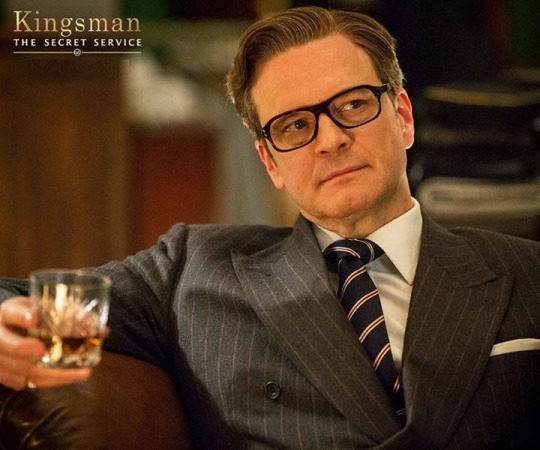


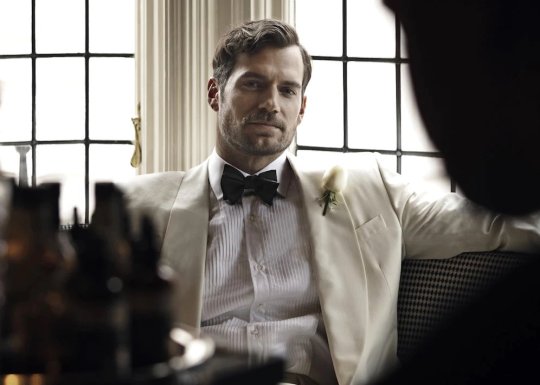

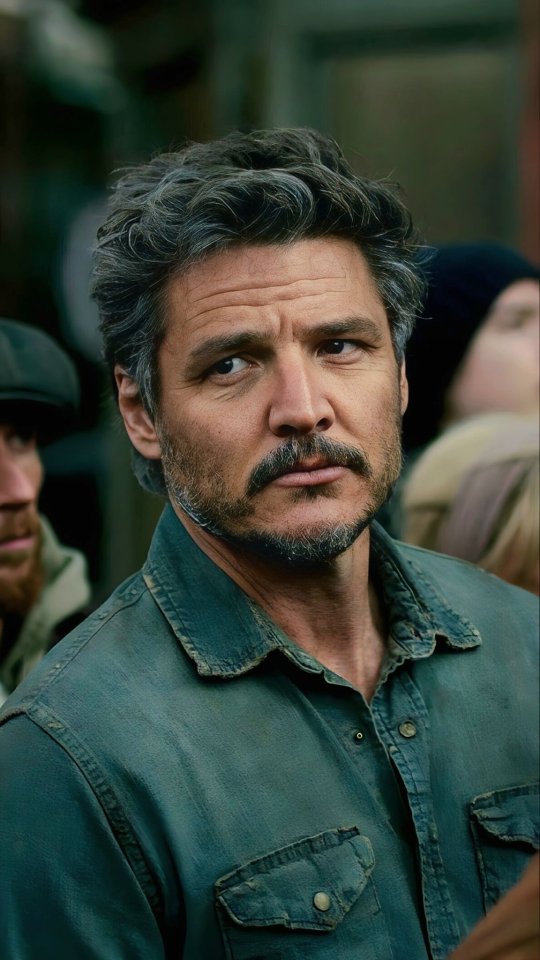


Please feel free to add more daddies to the list
#these r the men that haunt my dreams#the men that could break my back and rearrange my insides#only them#old man yaoi#middle aged actors#colin firth#harry hart#billy butcher#karl urban#mads mikkelsen#hannibal#henry cavill#oscar isaac#pedro pascal#joel miller#con o'neil#taika waititi
332 notes
·
View notes
Text
The bond between a girl and the middle-aged actor she saw in a movie years ago and now coincidentally has a big fat crush on is unstoppable
#i’m just a girl#sorry not sorry#but it’s a cannon event#🎀#lol 😝#iscar issac x reader#jason mamoa x reader#remus lupin x reader#middle aged men#anakin skywalker x reader#poe dameron x reader#<- thats my man#the man i was talking about#finnick odair x reader#🫧bubbles yaps#x-men x reader#this one too#miguel ohara x reader#oscar isaac x reader#i cant think of anymore actors but there is so much more
594 notes
·
View notes
Text
If I'm not supposed to have crushes on middle aged men then why are they so hot? Explain that political party of your choosing
#this counts for fictional middle aged men too btw#and men older than middle aged too 🙃 just easier to say middle aged#crushes#actors#tom cruise#gerard butler#mads mikkelsen#idris elba#jon bernthal#etc#benicio del toro#pedro pascal#matthew lillard#patrick dempsey#jeffery dean morgan#antonio banderas#hugh jackman#rick grimes#jason statham#dolph lundgren#bill paxton#kurt russell#henry cavill#jason isaacs
942 notes
·
View notes
Text
The more the show progresses, the more I want to see the 90s cast infiltrating the modern timeline. We've gotten hints of it with Shauna and her younger self, her Jackie hauntings. We've gotten a little more with adult Lottie seeing teenage Nat (and Laura Lee), and with Natalie getting teenage Lottie in her final moments. I want more. I want the teen cast to be absolutely invasive on pivotal adult moments, infecting their adult counterparts when least expected. I want Taissa's argument with Van to dissolve into their teenage selves, their bond endless and timeless and inescapable. I want Misty absolutely wrecked by young Natalie lurking around corners, watching from mirrors. I want to see these women unable to navigate adulthood without the specters of their teenage selves cropping up absolutely everywhere, more and more as they let the memories in, as they stop being able to repress the trauma. They didn't grow up. They never could. You are always doomed to regress around your high school teammates. You are haunted by the phantom elements of your misspent youth. It is a comfort, and it is a gift, and it is a trial, and it is a curse. I would love to see that reflected with greater intensity, until the lines blur, until the timelines have no choice but to intersect. They haven't escaped themselves at all. They didn't grow up. They just got older.
#yellowjackets#yj meta#yj theories#i love the moments of younger cast popping up in the modern timeline so fucking much#i am truly obsessed with the idea that they look at one another and they see the girls from the woods#they don't see the adult versions at all. they don't see adults in the mirror either#the older i get the more i feel like i'm 10 or 15 or 20 in a body that keeps outwardly aging#and if that's going to hit anybody it's going to be these people who have never been able to leave the hell of their adolescence behind#give me hewson and savoy brown popping up in the middle of a taivan fight (or makeout. i ain't picky).#give me thatcher continuing to appear to lottie and to misty in moments of duress#give me nelisse staring shauna down as she tries to backpedal into suburbia#haunt! these! women! haunt them GOOD#(also outside of narrative purposes it would be so fun to see the dual roles intersect. actors playing the same character getting#to play together. scenes where they blend. it would be satisfying in so many ways. i yearn.)
242 notes
·
View notes
Text
I finally had the chance to watch the Boston panel.
and I'm starting to think that a lot of you either haven't watched it yourselves, or were so set on specific opinions you personally have, while also having clear expectations of what their answers will be, that with their answers (or what are talked about as their answers) made you so unhappy that now you're just bashing them; especially Hugh.
why, though? none of the things I've seen people complain about were actually said like that or fully implied. so... what?
doesn't make sense to me why some of you are so upset about this panel. it was so much fun and just lighthearted entertainment. panels like that are the reason these things exist and are usually so much fun in the first place.
#genuinely tho wtf is up with the fandom lately i'm so tired of people being negative and bashing actors for not conforming to-#-personal headcanons; theories; and fanon. like. they are some random fucking middle-aged men#i think some of y'all need to actively remember that sometimes#putting actors on pedestals and having specific expectations you want them to fulfill no matter what-#-are self-inflicted tragedies waiting to happen#anyway the panel was so much fun and the best out of all recent 3 lol what's all the complaining about fr#hugh dancy#mads mikkelsen#nbc hannibal#i feel like a fandom elder at times like that lmfao (and in a way i am but only because i've been in fandom since i was 11-#-so i 'inherited' a lot of the old ways and stuff)
106 notes
·
View notes
Text
Eddie has a jacket in his room very similar, if not identical, to Billy's, which could mean nothing.
#i will not shut up#half my tt fyp has been taken over by middle two middle aged actors#the other half is two anthropomorphic dogs#idk what to do#eddie munson#billy hargrove#mungrove
102 notes
·
View notes
Text
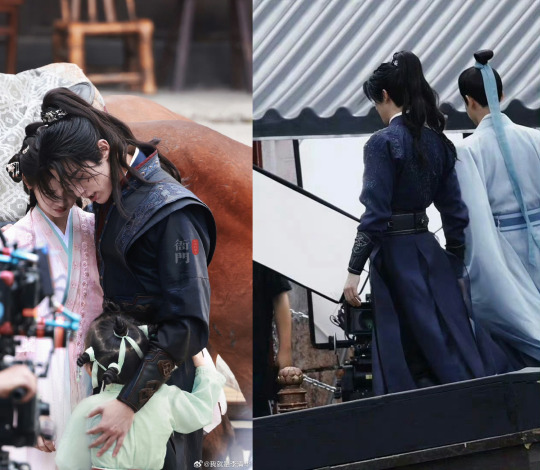
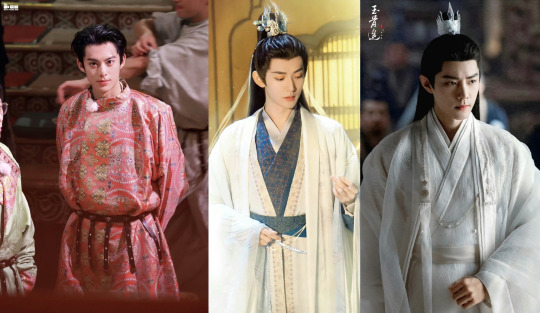

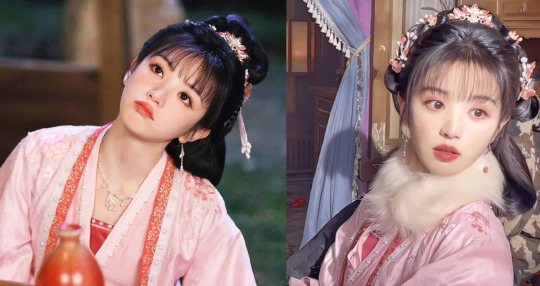
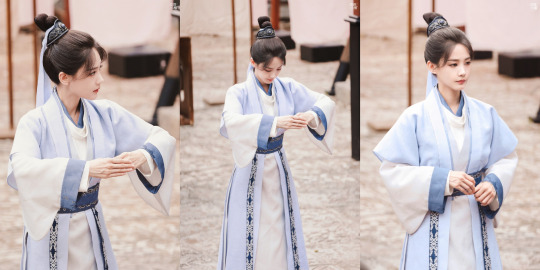

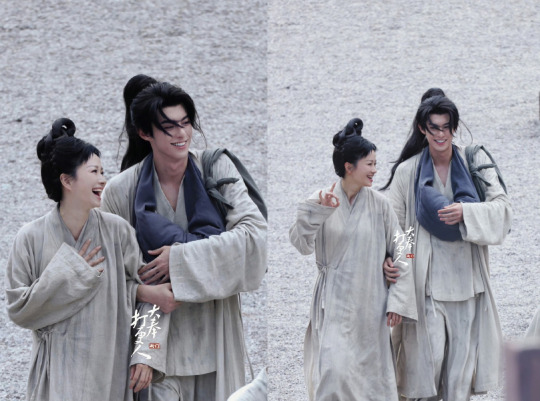
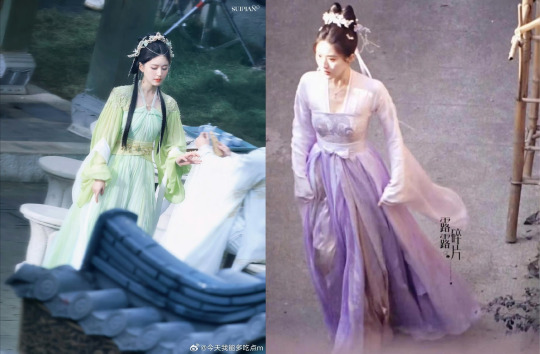

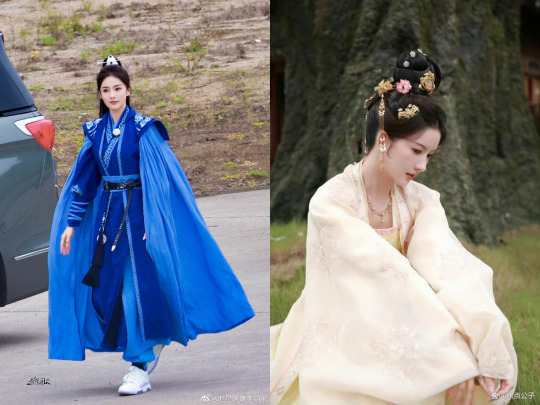

chinese guzhuang fashion
#young actress and actors are cornering the guzhuang market#that's why the industry is becoming more and more competitive#when it comes to guzhuang idol dramas/guouju古偶剧 with fantasy elements(like xianxia dramas)#cnetizens are bored with the same old faces#media has found that young actress and actors (20-27 years old) especially new pretty faces are more appealing to viewers#cnetizens can actually be mean to actress and actors (over 33 years old) cast as lead characters in guzhuang idol dramas#reasons is that lead characters are usually portrayed as teenagers or really young people#and the audience find it very weird to have middle-aged people cast such characters#especially scripts are usually adapted based on fictions#so fans of the novels would be furious about such casting#besides cnetizens want to see normal aging faces#but these shows always use excessive filters and PS#causing the midle-aged faces to be fake and weird#i once saw really mean comments on douyin for xianxia dramas casting middle-aged actress getting over one hundred thousand likes#actress and actors in zhengju正剧 guzhuang dramas or luodi落地 guzhuang dramas are not affected by this#like telling a realistic down-to-earth story or story inspired by real history or related to folks#and there is no fantasy or xianxia elements#china#fashion#chinese fashion#guzhuang#cdramas
313 notes
·
View notes
Text




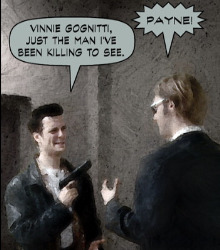
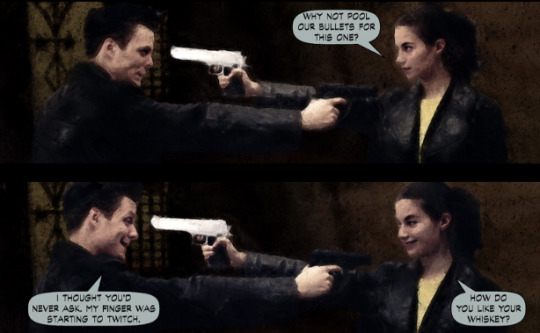
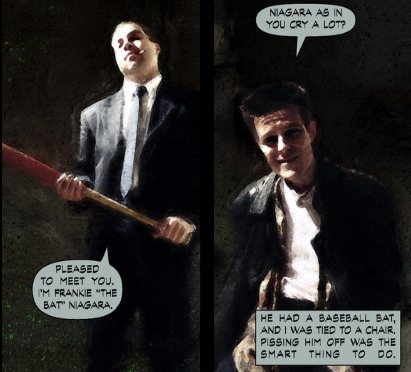
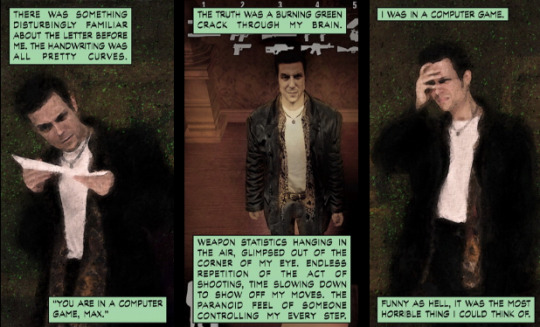
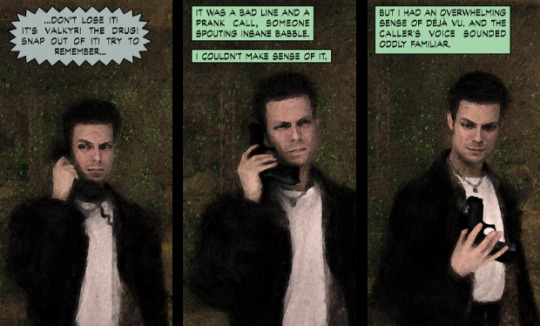



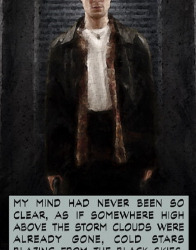

i started playing max payne 2 and was immediately so put off by how he no longer has sam lake's face that i decided to put together a collection of some of the max payne 1 panels that i really liked. enjoy <3
#max payne#max payne 1#remedy entertainment#sam lake#remedyverse#idk depending on how well-designed they are maybe i'll make a post of my favorite max payne 2 panels also#but like. i know literally they had 0 money when making the first game which is why sam lake just used his own face#(also he got his parents to model as woden and horne which is so incredibly funny/based of him to do)#and then for the sequel they could hire actual professional models/actors#but like c'mon. max payne 2 looks like a generic middle-aged dad protagonist of a 2000s action blockbuster#by comparison sam lake has such an interesting face (which if anything fits the raymond chandler film noir vibes even better)#i have very high hopes for the remake(s) that remedy is handling but in a way i hope they keep at least some of the unpolished aspects#anyway sorry y'all the remedy brainworms have gotten me there's no escaping this
90 notes
·
View notes
Text
Me watching critical role with my taylor swift bracelets and my corderoy pants: "can you please stop attacking me??"
#critical role#critical role spoilers#cr spoilers#cr liveblog#mom! the middle age voice actors are bullying me
19 notes
·
View notes
Text
got jumpscared by Misha Collins tits on twitter
113 notes
·
View notes
Text

Turns out historically, life hasn’t been easy for those who lived foolishly as foolish fools!
🎊🃏🎊
#history#jester#medieval europe#balatro#actor#roman history#joker#entertainers#fizzarolli#clowncore#royal jester#european history#helluva boss#vivziepop#royal core#ancient rome#medieval history#fool#fizzie#helluva boss fizzarolli#europe#christian history#clown#middle ages#performers#nickys facts
23 notes
·
View notes
Text
in honour of my first “supernatural is trending” day since coming back to tumblr (it’s been less than a week) I dedicated today to a mental health downwards spiral by reading up on cockles conspiracies
#did I mention I have an important assignment due Friday that I haven’t started#but I gotta prioritise and straddlegate comes first#balls deep in the shipping swamp#didn’t have shipping middle aged actors I’ve known about for a decade on my 2024 bingo card yet here we are#lmao does anyone still read tags or am I just talking to myself#spn#supernatural#misha collins#dean winchester#jensen ackles#destiel#castiel#cockles#jenmish#nesnej#cr8#straddlegate
52 notes
·
View notes
Text
ignore that this is a skyrim video and in polish but this is the polish VA of frank castle in the 1994 show and its the voice frank has in my head always. and i feel a strong need to share that with you guys bc i think it is a good voice
youtube
#marvel#frank castle#the punisher#in another version of the dub frank is voiced by a dude who voiced justice in dragon age awakening which is miles funnier for sure#but this voice is the same as the one that was on the DVDs that i had as a child. so to me this is frank's voice. forever. sorry!#jacek mikołajczyk thank you for having a cool as hell voice i guess#writing the name down so i dont forget it (will forget it anyway)#anyway yeah. voice headcanon. except its canon for polish people. some of them#I LOVE THIS VOICE IDK. hes no grzegorz pawlak but i think grzegorz would also be good for frank actually. maybe once hes like old old#and not just middle aged#no offence to pawlak. he voiced lucien lachance in polish skyrim and i love his voice also to bits#sorry sorry. polish voice actors are my passion.#fun fact also back to daa justice i used to selfship with him too lowkey in a sense. he and my cousland were so tragic <3#human x inhuman my beloved he missed her so much during da2 but didnt realize it until they met again and then they parted immediately
12 notes
·
View notes
Text

so real
#older men do it better#im just a girl#mentally fucked#mental health#lana del rey#older man younger woman#female rage#girl interrupted#trending#spencer reid#tate langdon#cillian murphy#middle aged men#actors#hot dad bod#girlblogging#girlhood#hell is a teenage girl#tumblr girls#just girly things#daddy's good girl#daddy issues#older daddy#you can be my daddy
11 notes
·
View notes
Text









Light from the moon overhead flooded the vault, washing her in a second wave of white over her garments and a candle behind him illuminated the subtle crooks in her face. Something about them now was reminiscent of a wedding night in the old world. @danime25 (x x)
#Mad Max#Mad Max: Fury Road (2015)#Furiosa (2024)#Angus Sampson#The Organic Mechanic#Organic Mechanic#Organic Mechanic x Reader#.my moodboards#.my grugife's fics#Not support danime25 in her middle aged blorbo agenda or draw 25? It's card time babyyyy 🃏#Ya'll should read her stuff. She can cook.#I almost put this on my Saw sideblog until I remembered that this actor has never been IN Saw. Just joined at the hip with Leigh 💀
18 notes
·
View notes
Text
You're Serious? - The Time Warrior, 1973
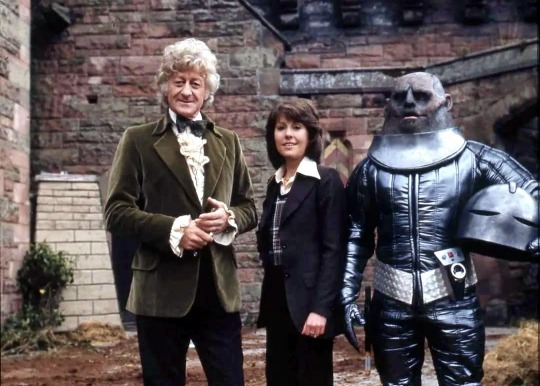
A fact that is becoming somewhat lost to time is that Jon Pertwee's time on Doctor Who was very popular. This is not to say that the Pertwee era is largely disregarded in 2024 but it does seem readily apparent, as time marches on, that the prevalence of Pertwee as a definitive, monolithic icon for the general public has naturally dwindled. Or, perhaps, dwindled is the wrong word – Pertwee's Doctor has truly been eclipsed by even mightier, entirely totemic icons that came in his wake. David Tennant is THE Doctor and the only other challenger remains the indomitable Tom Baker.
But back when I was a kid, circa 2004/2005, Jon Pertwee's era was definitive. My mum, who grew up in regional Australia, recalled fond memories of watching Pertwee and Katy Manning pal around with the Brigadier. A formative step in my journey as a fan was a visit to Hobbyco in Sydney and begging my mum for the Corgi Doctor Who 40th Anniversary Gift Set of die cast models. Like any number of similar curios that shape fan memories, this particular set cemented what were, to my mind, the most iconic building blocks of the series – the Doctor (a S18 Tom Baker, presumably for painting reasons), the TARDIS (not to scale with the rest of the models), K-9 (with lettering in both sides), the Daleks (a Chase model), Davros (no notes), the Cybermen (Earthshock model that I apparently either never got or immediately lost since I have not memories of owning one) and Bessie (also not to scale), driven by Tom Baker. I vividly recall purchasing the set and the guy at the counter being excited to strike up a conversation. He was obviously a fan and talked fondly about the highlights of the series. What I realised in the years that have flowed on since is that, despite speaking highly of the Fourth Doctor and Sarah Jane, the most vivid of those rosy fan memories, the ones he and many other adults always relayed to me pre-revival, were of UNIT and the Master and the Sea Devils and Bessie* and the Axons and the Sontarans.
Put into perspective, this makes a great deal of sense. Leaving aside my home country's personal context (mid-'70s DW was infamously repeated on the ABC, a fact that was immortalised in DWM #104 when Tasmanian Jamie Hillard complained of the tedium of seasons eleven to fourteen being repeated twice a year, every year for the past five years. He was suitably rinsed by the UK fandom), Jon Pertwee's era was the most popular Doctor Who had ever been. While the show chugged along just fine during Troughton's tenure, it was in dire straits when producer Barry Letts inherited it partway through production of season seven, Pertwee's first, in 1970. It was only off the strength of what made it to screen that the programme was renewed at all. Throughout the four years that followed, Letts and script-editor Terrance Dicks retooled Doctor Who from Derrick Sherwin's vision of a hard-edged, political sci-fi thriller into the more accessible glam-infused comic-book show that raked in as many as ten million viewers a week for the first time since 1965.
But a good thing only lasts so long and, by the time of late 1973, just as Doctor Who was kicking off its eleventh season, it felt like a natural end was coming to what had been an incredibly successful five years. Pertwee’s Doctor Who had became an institution in its own right. Not to get too ahead of myself but there is a strong case to be made that Tom Baker and the Philip Hinchcliffe's era ascent to being the most popular the show ever was in its original run owes as much, if not more, of its success to the goodwill and steadily rising audience of the Pertwee years than it does to its actual quality (and it is of a very high quality). This is entirely hyperbolic but I strongly believe that had anybody else been cast as Pertwee's successor, anything less than the perfect storm we got, the Letts/Dicks/Pertwee run of the show would send out as the cultural peak even today. Bessie and the Brig would be wheeled out by the norms instead of the long scarf and K-9, that you can believe,
As everybody reading this article would know, the earthbound stories of Pertwee's time were notable for a distinct 'family feel', so to speak. Unlike previous eras, and any until 2005, the Third Doctor had an ongoing, regular supporting cast of UNIT personnel and assistants as well as the recurring threat of Roger Delgado's Master. There is a familiarity and comfort to the Third Doctor's run. Over the course of the previous year’s season ten, however, Letts and Dicks decided that the format had well and truly run its course and the Doctor was propelled into space and time full-time once again, leaving behind the UNIT regulars as merely recurring characters. It was during this production cycle that Katy Manning had decided that it was time for her to move on from the show, departing at the end of The Green Death, the last story broadcast that season. The final serial of season ten's production block, however, was actually the first story of season eleven – The Time Warrior.
Throughout the 1973-74 season, a slow (and conscious) dismantling of the Pertwee era begun taking place as well as a distinct sense of a lap of honour for the previous four seasons. In real life, this begins with Manning's departure in 1973 which, while her own instigated decision, was encouraged by Letts for fear his two stars would jump ship at the same time. Letts and Dicks had themselves decided to move on by the time season eleven proper began production which ultimately left Pertwee, self-conscious of his self-proclaimed team breaking up, finally deciding to give up the reigns after the tragic death of Roger Delgado. Onscreen, of course, this plays out somewhat quietly masterful. Malcolm Hulke's Invasion of the Dinosaurs is a conspiracy laden, political thriller such as those of season seven (detractors would call it parody) and saw the departure of now disgraced UNIT captain Mike Yates. Death to the Daleks (the hardest to square this circle, tbf)called back to the season ten’s epic return of the ‘60s Dalek adventure and offered the last gasp of the traditional, Hartnell style adventure serial that still permeated across Pertwee's time. The Monster of Peladon offered a direct sequel to the fan-favourite from season nine with some nice, deliberate telegraphing of the Doctor's oncoming death. And then there's the grand finale, Planet of the Spiders, where the Third Doctor departs the show with his remaining UNIT family under a series of self-referential and, frankly, indulgent circumstances set off by his own cavalier behaviour. Season eleven is a twenty-six episode finale for the Pertwee era that retreads all of the highs and exposes its limitations quite deliberately. With all of this in mind, The Time Warrior, the series opener, is entirely lacking in this sort of farewell mentality stands out as something of a different beast for the year.
For each of their seasons on the job, Letts and Dicks made a conscious effort to open each year with a big event and season eleven was no exception. After an absence of eight years (no, The Time Monster doesn't count), the duo thought that it was time for the return of the historical story. Somebody who disagreed, however, was Robert Holmes. Holmes had been a frequent contributor over Dicks' tenure as script-editor and was less than enthused that his proposal, The Automata, was rejected for him to be reassigned an historical. Dicks suggested an adventure be set in and around a medieval castle (it was filmed between Peckforton Castle and Wessex Castle to stunning results) and Holmes agreed only on the proviso that no famous historical figures were to be featured and that strong science-fiction elements were to still be included. The story that made it to screen has become one of the most renowned and celebrated in the history of the show. Frequently, I see it touted up alongside the all-time greats in the franchise as one of the very best and a real highlight of Jon Pertwee’s time in the show. While I think that The Time Warrior is very good, and there is a lot that I really like about it, this level of high praise has never sat entirely well with me. I don't even really have a lot to say on it. I like it a lot, it is the highlight of season eleven and one of many high points of Pertwee's run, but I have never found it to be an unshakable classic.
Let's not get too in the weeds too soon, though because Robert Holmes was a magnificent writer. Despite his personal disinterest, the man took his brief seriously clearly put in a lot of thought into getting the most out of this particular assignment. There is almost an overabundance of wit and charm and character to The Time Warrior's ensemble. As with most sharply intelligent people, Holmes was also obviously quite cynical and Instead of leaning into something fantastically Arthurian or romantically noble, he opted for a medieval world of pure grime and nastiness. This could be taken as Holmes leaning fully into the historical story's roots as an educational programme, insisting upon the most realistic depiction of the middle ages he could on a BBC budget for a family audience. I find this hard to believe. No, what Holmes was far more likely to do, and did, was recognise that this approach would have worked perfectly well and then take the next step which is basically to take the piss out of it. The Time Warrior is not just a witty script, it is hilariously absurd and over-the-top in every aspect of its conception. Irongron and Bloodaxe are laughably incompetent and self-absorbed but the pair it is in how gleefully squalid and brutal they are that Holmes relishes in. Yes, there is a realism to The Time Warrior in that it is not the Shakespearean or mythic depiction one might have expected from the Hartnell days how but the over-exaggeration of the repulsiveness and savagery of medieval life is what I truly adore. Mind you, this is largely just what's on the surface. Holmes is obviously doing here is writing an exaggerated depiction of middle-aged England that is functionally indistinguishable from England as it was in 1973. Holmes basically invented Blackadder. As great as this is, though, it doesn't always work in its favour. We'll get to Sarah Jane shortly.
A different aspect of this serial that has made it so iconic is its main villain. Determining that a small-scale threat would be easier both for him and for the production team, Holmes’ plot revolves around a single alien menace attempting to find his way home. Allegedly inspired by his recent reading of the On War treatise, Holmes was compelled to create an entirely militaristic villain and what he created was the character of Commander Linx, as performed by Kevin Lindsay. However well Linx is realised in the story, as much praise as anyone needs to be directed to make-up designer Sandra Exelby and costume designer James Acheson for their realisation of him. Linx, and by extension the Sontarans themselves, is a grotesque creature with a troll-like quality. It has not escaped notice for many that the species design is built around an extended gag – that part one cliffhanger. Still, fans continuously fail to appreciate just how goddamn funny Linx is. The characterisation is brilliant and nobody behind the scenes, until Steven Moffat, seems to realise that this is why he works.
Holmes, in no genuinely dramatic way, utilises Linx as a threat. What he is instead, besides a visual joke, is a scathing satire of militaristic ideals. That avenue also lends itself perfectly to the exaggerated depiction of the middle-ages. In his first scene, Linx emerges before the primitive natives, in strange armour with advanced weaponry, and claims that this new land now belongs to the Sontaran Empire as he plants a flag and assumes dominance over the people. It doesn't require much analysis to decipher what's happening here. Throughout the story, Linx, whose lines almost entirely consist of spouting rhetoric, offers to make weapons for the humans he's met, all the while condescending them and caring little for their lives and livelihoods. It's a simple but fantastically clever move; Holmes has taken the opportunity to depict the English, typically at one of their most mythic and noble periods, as a cowardly and cruel race to be easily oppressed and mocked.
The Time Warrior also sees the debut of another mainstay in Doctor Who lore in Sarah Jane Smith. Created by Barry Letts in direct contrast to her predecessor, Sarah Jane was pitched to directly address accusations of sexism that the series had garnered by being an obviously capable, career-driven, feisty and adventure-seeking investigative journalist. Incredibly, the role was cast before Elisabeth Sladen had even auditioned and, if to weren't for an uproar made by Pertwee due to his not being consulted, the part would have gone to April Walker show was paid out of the part when Letts cast Sladen (after he'd arranged for her to meet Pertwee, of course). For perhaps the wrong reasons, Pertwee was entirely correct though. From her first appearance, it is impossible not to be enamoured by Elisabeth Sladen. She just has a natural charm in this role and a captivating quality that makes her so very easy to watch.
As introduced in The Time Warrior, Sladen is certainly strong. She is well-defined, well-performed and plays a major role in the events of the plot. She is also at the core of the serial's biggest stumbling block which can come down to Holmes' poorly pitched snark. It is certainly one of Holmes’ regular tricks to lean heavily into sardony and lampshading things that, he at least considers to be, regressive and absurd ways of thinking. Sometimes this can really serve the story the is telling and the characterisation, it does so elsewhere in this one. Here, however, I think he misses the mark drastically and it comes off very poorly. In making the world of The Time Warrior such an exaggerated and vitriolic comment on contemporary Britain, Sarah has little place to assume control in the narrative and is rather brutally victimised by it.
Sure, Sarah Jane is firmly established as a feminist icon and it is a fine idea to drop her into the wretched sexism and reality of how horrible women were treated in the Middle Ages but emphasis is all wrong and it comes off so mean-spirited to me. In a similar vein, so much of the Doctor’s dialogue is designed to tease her about her strong values. The effect of all of this is likely intended to be endearing, and it is certainly to be funny but it comes off so smug and unnecessary. Sarah's beliefs, and the entire concept of feminism by extension, are singled-out as a futile gesture. Women are put down, they have also been put down and they always will be. This is perfectly in line with Holmes' approach to storytelling and his flavour of social commentary. It is also does not work at all.
Even though the Doctor frequently becomes Holmes' mouthpiece, I must stress that Jon Pertwee is not the problem at all. At this point in his run, the actor is so comfortable and confident in his performance that it would be impossible for him to disappear in it. To be honest, this is really the last time he properly turns up during his run since the season eleven filming Despite his oddly sexist jabs, the Third Doctor is wonderfully charismatic and relaxed in this story. There is a lovely development of his character from the rather pig-headed, irrational and moody character from season seven to the more mischievous tutor role he starts to settle into here. It is a similar progression to the First and Twelfth Doctors though rarely garners the same recognition.
The Time Warrior also has a few structural problems in my opinion, especially in episode three. The penultimate quarter of a Doctor Who serial always seems to be the hardest to write without playing for time, the three act structure is so familiar for a reason, and this one is no exception feeling like it does waste quite a lot of time with the Doctor arsing. Getting out of the castle and going back in and all for no really good reason other than to stretch out the runtime. Obviously, all of the antics are fun. This is a good production and Alan Bromley's only true directorial credit but it still has a bit of a sag, in my opinion. Is The Time Warrior a bad story? Far from it. Nothing as fun and as well made as this could possibly be considered wholly bad in my books. It is flawed, certainly but there is so much here to love. In a season of greatest hits, The Time Warrior stands out like a toad-faced git, chuckling with glee at how clever it is.
Later in the year, and despite the reservations of the BBC Head of serials, Holmes would be offered the position of script-editor for season twelve. He took the offer up and, in hindsight, it makes The Time Warrior somewhat of an intriguing curio. On the one hand, this is the last product of the creative fury that was season ten. On the other, it is a tantalising glimpse into what lies ahead around the corner. The Hinchcliffe era doesn't obviously have much in common with The Time Warrior, it is a lot funnier than a lot of those stories would be, but there is a more subtle stylistic shift to be seen here. This is not a comic-book adventure serial. The action is not explosive and the dialogue is not pulpy and punchy in the same way. The Time Warrior is more literary. Not inherently a better or even more intelligent choice but the distinction is palpable. Underneath the sheen of a gritty historical is a silly story about squalid and mean characters whose lives are miserable and ambitions are low. Even with the Doctor, still under UNIT's employ, there is a clear sense of his ready to move on from this status quo. The wheels of the next era are slowly in motion. Even the title sequence has changed, slowly morphing into its next identity but it's not quite there yet. Instead of looking back on the era that is closing up, The Time Warrior sets its sights firmly on the future.
It's not even close to the best Pertwee story though.
*He did, however, question why the Bessie model featured a S18 Tom in the driver's seat saying that it was "mostly Pertwee" who drove the car. Throughout my childhood, I found it easy to reconcile this though thanks to Tom's appearance in the The Five Doctors photoshoot. It's obvious, really.
#doctor who#analysis#culture#tv#behind the scenes#history#actors#review#third doctor#jon pertwee#sontarans#sarah jane smith#sja#satire#irony#humour#sarcasm#ironic#iconic#medieval#middle ages#classic who#classic doctor who
13 notes
·
View notes